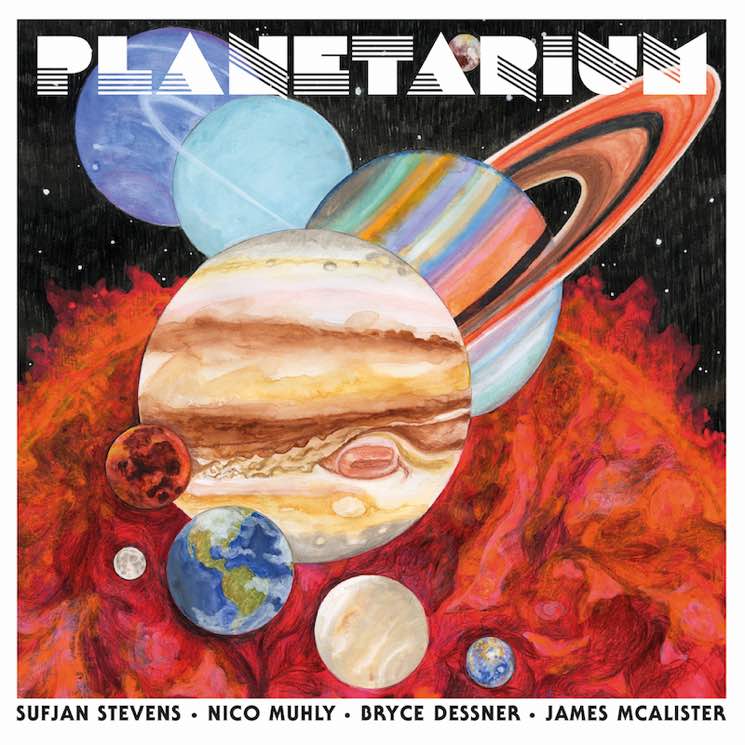Take three co-commissioning music halls from Belgium, Australia and the UK; add four acclaimed American songwriters, a string quartet, seven trombones, eight planets, a dwarf called Pluto, a star called Sol and a handful of celestial and earthly phenomena; wait five years.
The result is Planetarium, a cosmic playlist that toured the world in 2012 after composer Nico Muhly enlisted Sufjan Stevens and the National's Bryce Dessner to pay homage to the solar system. All three had contributed to Stevens' 2009 Run Rabbit Run, and in various ways over the years. Stevens' long-time drummer James McAlister joined percussion and electronic texture to the project, and together with the singer's evocative vocals and Dessner's gripping harmonies, Muhly's compositions became a pulsing, expanding thing.
Add the LP to Stevens' list of lists; he's known for projects that explore first names, the 50 states and zodiac signs. Here, mythological history is wrapped into stories that explore science, legend and varying perspectives, usually sung through effects pedals. "Venus," for example, references the deity, the painting of her being born on a half-shell, the fly-trap sea anemone and Stevens' own spiritual and sexual history with "Methodist summer camp," all at once. "Mars" shines from industrial beat to inviting melody and orchestral interlude as Stevens sings about the Roman god of war: "I reside in every creature / dispose of the future / or put away your sword."
"Moon" is as divergent in sound, with popping electronica blips and flutes; it references both Asian and Cree legends about the rabbit shape in the moon. "Pluto," full of regal strings and horns, seems to be the most classical of the set, but it's followed up by the punchy pop of "Kuiper Belt." While "Black Hole" is an interlude that spells out imminent danger, and "Halley's Comet" is a fleeting stop, like a wink. Throughout, Dessner's masterful guitar work and McAlister's electronic punctuation propel the unearthly poetry in avant-garde harmony.
The howling monolith sound of 2001: A Space Odyssey is evoked briefly on the 15-minute opus "Earth," which centres on the contradictions and difficulties of living on the blue planet, but otherwise the album is unfamiliar by sci-fi standards. Planetarium does the solar system justice with almost every conceivable sound — from metallic auto-tune to rippling organ, to angelic strings and forceful horns — from four powerful multi-instrumentalists at the top of their respective games.
(4AD)The result is Planetarium, a cosmic playlist that toured the world in 2012 after composer Nico Muhly enlisted Sufjan Stevens and the National's Bryce Dessner to pay homage to the solar system. All three had contributed to Stevens' 2009 Run Rabbit Run, and in various ways over the years. Stevens' long-time drummer James McAlister joined percussion and electronic texture to the project, and together with the singer's evocative vocals and Dessner's gripping harmonies, Muhly's compositions became a pulsing, expanding thing.
Add the LP to Stevens' list of lists; he's known for projects that explore first names, the 50 states and zodiac signs. Here, mythological history is wrapped into stories that explore science, legend and varying perspectives, usually sung through effects pedals. "Venus," for example, references the deity, the painting of her being born on a half-shell, the fly-trap sea anemone and Stevens' own spiritual and sexual history with "Methodist summer camp," all at once. "Mars" shines from industrial beat to inviting melody and orchestral interlude as Stevens sings about the Roman god of war: "I reside in every creature / dispose of the future / or put away your sword."
"Moon" is as divergent in sound, with popping electronica blips and flutes; it references both Asian and Cree legends about the rabbit shape in the moon. "Pluto," full of regal strings and horns, seems to be the most classical of the set, but it's followed up by the punchy pop of "Kuiper Belt." While "Black Hole" is an interlude that spells out imminent danger, and "Halley's Comet" is a fleeting stop, like a wink. Throughout, Dessner's masterful guitar work and McAlister's electronic punctuation propel the unearthly poetry in avant-garde harmony.
The howling monolith sound of 2001: A Space Odyssey is evoked briefly on the 15-minute opus "Earth," which centres on the contradictions and difficulties of living on the blue planet, but otherwise the album is unfamiliar by sci-fi standards. Planetarium does the solar system justice with almost every conceivable sound — from metallic auto-tune to rippling organ, to angelic strings and forceful horns — from four powerful multi-instrumentalists at the top of their respective games.
